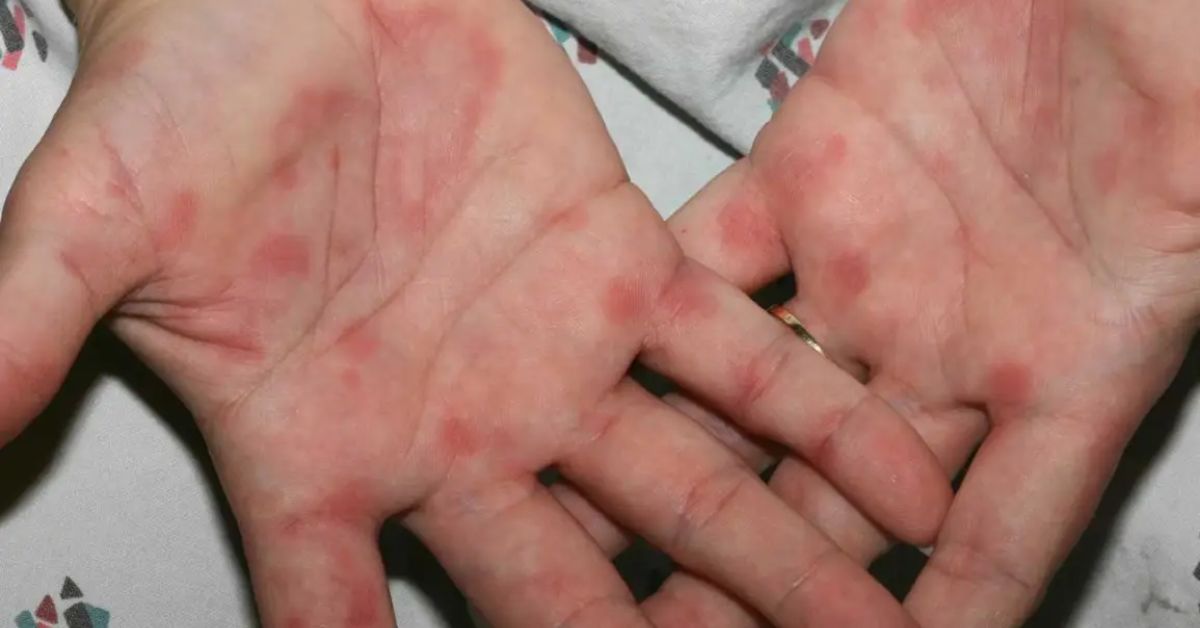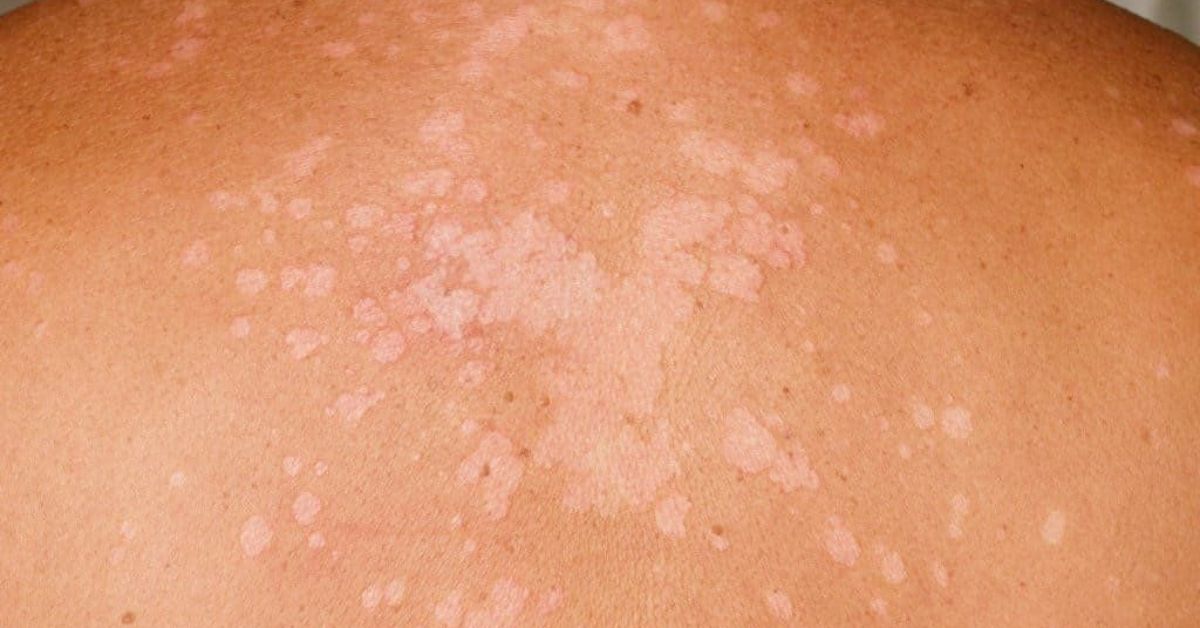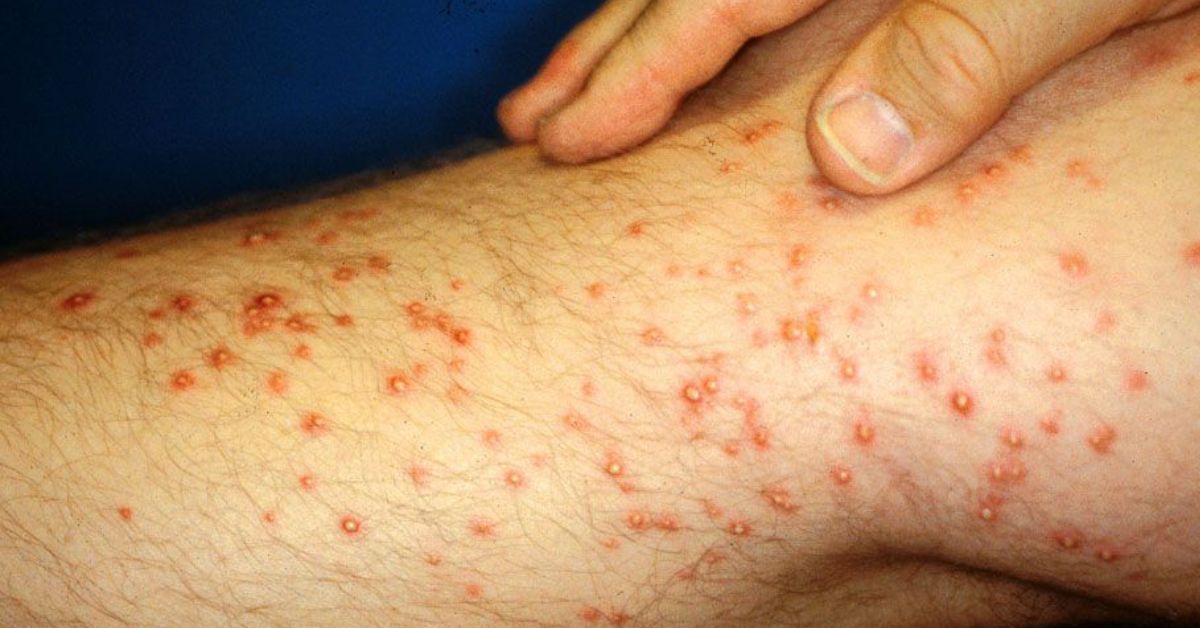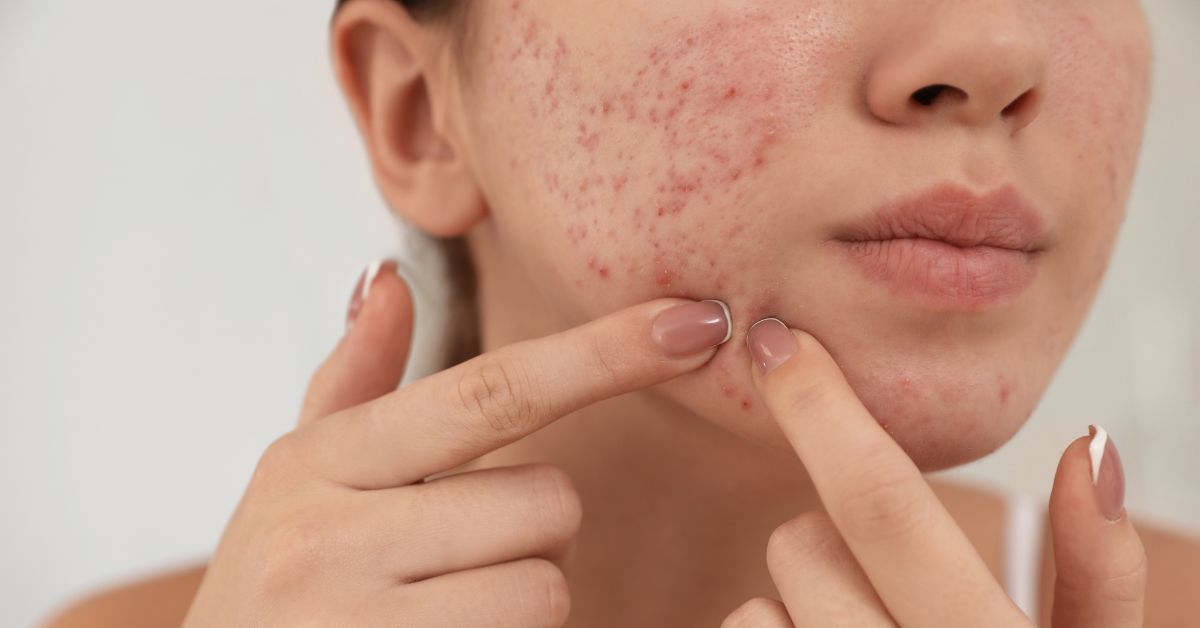When it comes to outdoor adventures, pesky insects can often leave their mark – literally. Insect bites frequently result in red, swollen, and itchy skin reactions that can range from mildly annoying to potentially dangerous. As a seasoned health professional with over five decades of experience, I’ve seen countless cases of insect bites and their varied effects on the human body. This comprehensive guide will delve into the causes, symptoms, treatments, and prevention strategies for insect bites red swelling itchy, equipping you with the knowledge to handle these common yet sometimes troublesome occurrences.
Understanding Insect Bites
What Causes Red Swelling and Itch After an Insect Bite?
The moment an insect’s mouthparts penetrate your skin, a complex chain of events begins. The primary culprits behind the red, swollen, and itchy aftermath are the proteins found in insect saliva or venom. These foreign substances trigger your body’s immune system to launch a defensive response, resulting in the classic symptoms we associate with insect bites.
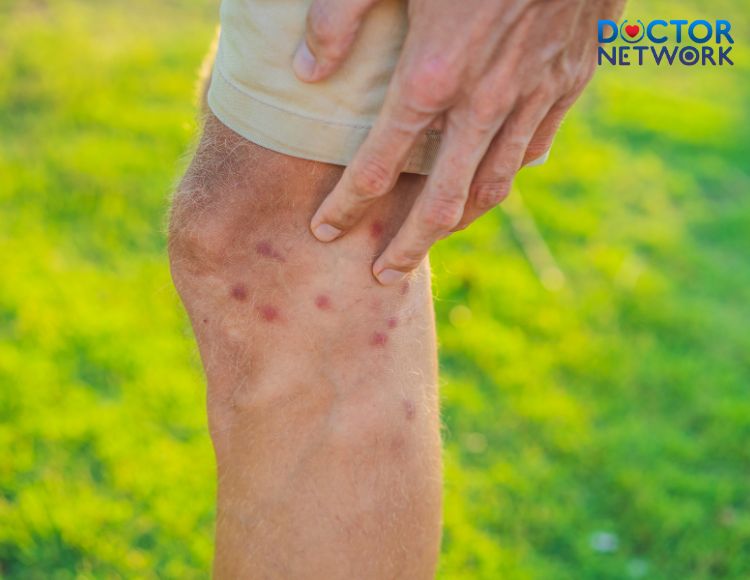
The moment an insect’s mouthparts penetrate your skin, a complex chain of events begins
Key factors contributing to bite reactions:
- Histamine release
- Inflammatory mediators
- Individual sensitivity
Identifying the Culprit: Common Insect Bites
Not all insects leave the same calling card on your skin. Recognizing the specific characteristics of different bites can help you identify the offending creature and determine the appropriate course of action.
| Insect | Bite Appearance | Common Symptoms |
|---|---|---|
| Mosquito | Small, raised red bump | Intense itching, mild swelling |
| Fire Ant | Pustule on a red base | Burning sensation, possible blistering |
| Spider | Two puncture marks | Pain, redness, potential necrosis (in some species) |
| Bed Bug | Line or cluster of red, itchy welts | Intense itching, often in a linear pattern |
Recognizing the Symptoms of an Insect Bite
While symptoms can vary depending on the insect and individual sensitivity, common signs of insect bites include:
- Redness (erythema)
- Swelling (edema)
- Itching (pruritus)
- Pain or tenderness
- Possible blistering or welts
In some cases, individuals may experience more severe reactions due to allergies or sensitivity to specific insect venoms.
When to Seek Medical Attention
While most insect bites can be managed at home, certain situations require immediate medical intervention. Be vigilant for signs of:
- Anaphylaxis (a severe allergic reaction)
- Difficulty breathing
- Swelling of the face, throat, or tongue
- Rapid pulse
- Dizziness or fainting
- Infection
- Increasing redness and swelling
- Warmth around the bite area
- Pus or discharge
- Fever
- Persistent or worsening symptoms
- Pain lasting more than 24 hours
- Swelling that continues to expand
- Bites in sensitive areas
- Near the eyes
- Inside the mouth or throat
If you experience any of these symptoms, seek medical attention promptly.
Treating Insect Bites at Home
Immediate First Aid for Insect Bites
When you first notice an insect bite, take these steps to minimize discomfort and prevent complications:
- Clean the area thoroughly with soap and water
- Apply a cold compress to reduce swelling
- Elevate the affected limb if possible
- Avoid scratching to prevent infection
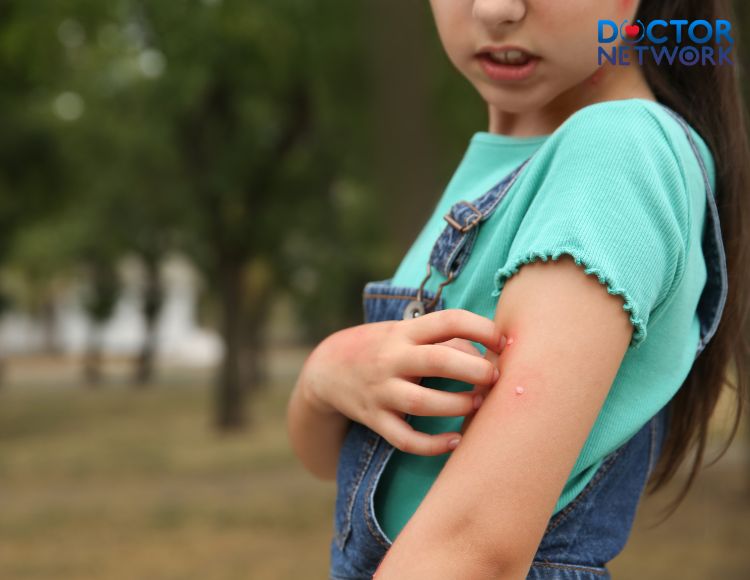
Avoid scratching to prevent infection
Over-the-Counter Remedies for Itch and Swelling
Several readily available products can provide relief from insect bite symptoms:
| Product Type | Examples | Benefits |
|---|---|---|
| Topical Antihistamines | Hydrocortisone cream, Benadryl cream | Reduces itching and inflammation |
| Oral Antihistamines | Cetirizine, Loratadine | Alleviates systemic allergic reactions |
| Calamine Lotion | Various brands | Soothes itching and dries oozing bites |
| Anti-Itch Sprays | Phenol-based sprays | Provides quick, temporary itch relief |
Natural Home Remedies for Insect Bites
For those preferring natural alternatives, consider these time-tested remedies:
- Baking soda paste: Mix with water and apply to soothe itching
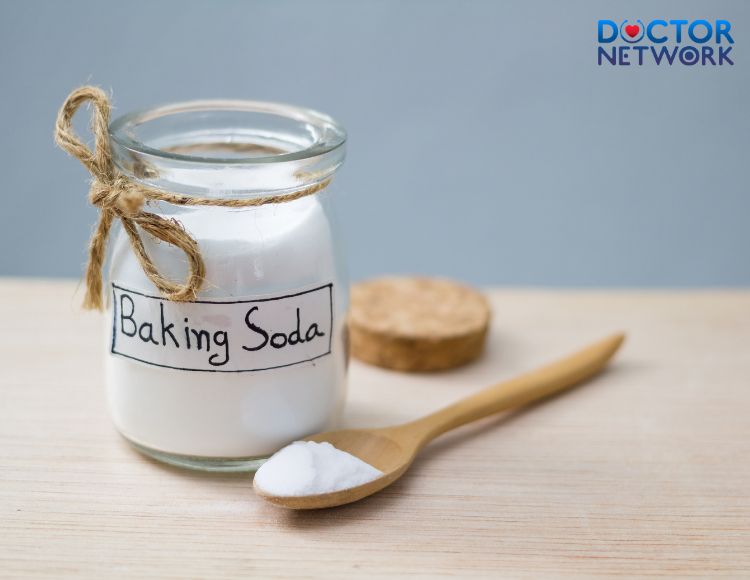
Using baking soda helps neutralize toxins and reduce swelling
- Apple cider vinegar: Dab on bites to reduce inflammation
- Aloe vera gel: Cools and calms irritated skin
- Tea tree oil: Has antiseptic properties (dilute before applying)
While these remedies can be effective, individual results may vary. Always perform a patch test before applying any new substance to your skin.
Preventing Insect Bites
Protecting Yourself Outdoors
Proactive measures can significantly reduce your chances of falling victim to biting insects:
- Wear light-colored, long-sleeved clothing
- Apply EPA-approved insect repellents containing DEET, picaridin, or oil of lemon eucalyptus
- Avoid peak insect hours (dawn and dusk for many species)
- Stay away from standing water and dense vegetation
Creating an Insect-Free Environment
Minimize insect populations around your home with these strategies:
- Install and maintain proper screens on windows and doors
- Use mosquito nets when sleeping outdoors or in endemic areas
- Eliminate standing water sources (empty birdbaths, fix leaky faucets)
- Keep outdoor eating areas clean and covered
- Consider professional pest control services for persistent problems
By implementing these preventive measures, you can significantly reduce your exposure to biting insects and enjoy the outdoors with peace of mind.
Understanding Allergic Reactions to Insect Bites
What is an Allergic Reaction?
An allergic reaction occurs when your immune system overreacts to a normally harmless substance, in this case, insect venom or saliva. This hypersensitivity can lead to more severe symptoms than typical insect bite reactions.
Signs of an Allergic Reaction
Be alert for these potential signs of an allergic reaction to insect bites:
- Widespread hives or rash
- Swelling beyond the bite site, especially of the face or throat
- Wheezing or difficulty breathing
- Nausea, vomiting, or abdominal pain
- Dizziness or fainting
Managing Insect Allergies
If you suspect you have an insect allergy:
- Consult an allergist for proper testing and diagnosis
- Discuss the possibility of immunotherapy (allergy shots)
- Obtain a prescription for an epinephrine auto-injector (EpiPen) if recommended
- Wear a medical alert bracelet indicating your allergy
Remember, severe allergic reactions can be life-threatening. Always carry your prescribed medication and seek immediate medical attention if you experience symptoms of anaphylaxis.
Frequently Asked Questions About “insect bites red swelling itchy”
How long do insect bite symptoms typically last?
Insect bite symptoms, including redness (erythema), swelling (edema), and itching (pruritus), usually persist for a few days to a week. Mosquito bites often resolve within 3-4 days, while bee or wasp stings may take up to a week. However, individual reactions can vary based on factors such as the type of insect, the person’s immune response, and whether the bite becomes infected. If symptoms worsen or last longer than a week, consult a healthcare provider or dermatologist.
What’s the best way to stop the itching from an insect bite?
To alleviate itching from insect bites, try these methods:
- Apply a cold compress or ice pack to reduce inflammation and numb the area.
- Use over-the-counter topical antihistamines like hydrocortisone cream or calamine lotion.
- Take oral antihistamines such as diphenhydramine (Benadryl) or cetirizine (Zyrtec).
- Try natural remedies like a baking soda paste or aloe vera gel.
- Use an anti-itch spray containing phenol or menthol for quick relief.
Remember, avoiding scratching is crucial to prevent secondary bacterial infections and further irritation.
How can I tell if an insect bite is infected?
Signs of an infected insect bite include:
- Increased redness, swelling, and warmth around the bite area
- Formation of pus or discharge
- Fever or chills
- Swollen lymph nodes
- Red streaks extending from the bite (lymphangitis)
- Increased pain or tenderness
If you notice these symptoms, especially if accompanied by a fever, seek medical attention promptly. A healthcare provider may prescribe antibiotics to treat the infection.
Are there any home remedies that can help reduce swelling from insect bites?
Yes, several home remedies can help reduce swelling from insect bites:
- Apply a cold compress or ice pack wrapped in a cloth for 10-15 minutes at a time.
- Elevate the affected area if possible to reduce blood flow and minimize swelling.
- Create a paste using baking soda and water, then apply it to the bite.
- Use a slice of raw onion or potato on the bite (their enzymes may help reduce inflammation).
- Apply witch hazel, a natural astringent, to the affected area.
- Try a diluted tea tree oil solution, known for its anti-inflammatory properties.
While these remedies can be effective, if swelling persists or worsens, consult a healthcare professional.
When should I be concerned about an allergic reaction to an insect bite?
Be vigilant for signs of a severe allergic reaction (anaphylaxis) following an insect bite or sting, which can include:
- Difficulty breathing or wheezing
- Swelling of the face, throat, or tongue
- Rapid pulse or heart palpitations
- Dizziness, fainting, or loss of consciousness
- Nausea, vomiting, or abdominal pain
- Widespread hives or rash beyond the bite site
If you experience any of these symptoms, especially after a bee or wasp sting, seek emergency medical attention immediately. People with known severe allergies to insect bites should carry an epinephrine auto-injector (EpiPen) at all times and wear a medical alert bracelet.
Scientific researches on “insect bites red swelling itchy”
- “Immunological Mechanisms in Mosquito Allergy: Correlation of Skin Reactions with Specific IgE and IgG Antibodies and Lymphocyte Proliferation Response to Mosquito Antigens” của Peng và cộng sự, xuất bản trên Tạp chí Allergy and Clinical Immunology năm 1996.
- “The Role of Histamine in Neurogenic Inflammation” của Thurmond và cộng sự, đăng trên British Journal of Pharmacology năm 2008. Nghiên cứu này giải thích cơ chế gây ngứa và sưng đỏ sau khi bị côn trùng cắn.
- “Insect Sting Allergy and Venom Immunotherapy: A Model and a Mystery” của Golden, xuất bản trên Journal of Allergy and Clinical Immunology năm 2005. Bài báo này thảo luận về phản ứng dị ứng với nọc côn trùng.
- “Management of Insect Sting Hypersensitivity: An Update” của Bilò và cộng sự, đăng trên Allergy năm 2019. Đây là một tổng quan cập nhật về cách quản lý phản ứng quá mẫn với nọc côn trùng.
- “Mosquito Saliva: A Multifunctional Cocktail of Secretory Molecules” của Ribeiro và Francischetti, xuất bản trên Infection and Immunity năm 2003. Nghiên cứu này phân tích các thành phần trong nước bọt muỗi gây ra phản ứng trên da.
Conclusion
Armed with this comprehensive guide to insect bites, you’re now better equipped to identify, treat, and prevent these common outdoor nuisances. Remember that while most insect bites are merely an annoyance, some can pose serious health risks. By staying vigilant, taking preventive measures, and knowing when to seek medical help, you can safely enjoy all that nature has to offer. If you have ongoing concerns about insect bites or allergic reactions, don’t hesitate to consult with a healthcare professional or allergist for personalized advice and treatment options.
References:
https://www.medicalnewstoday.com/articles/174229
Kiểm Duyệt Nội Dung
More than 10 years of marketing communications experience in the medical and health field.
Successfully deployed marketing communication activities, content development and social networking channels for hospital partners, clinics, doctors and medical professionals across the country.
More than 6 years of experience in organizing and producing leading prestigious medical programs in Vietnam, in collaboration with Ho Chi Minh City Television (HTV). Typical programs include Nhật Ký Blouse Trắng, Bác Sĩ Nói Gì, Alo Bác Sĩ Nghe, Nhật Ký Hạnh Phúc, Vui Khỏe Cùng Con, Bác Sỹ Mẹ, v.v.
Comprehensive cooperation with hundreds of hospitals and clinics, thousands of doctors and medical experts to join hands in building a medical content and service platform on the Doctor Network application.
















